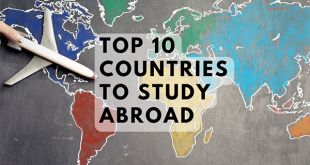As you set out to explore the world of higher education in a foreign country, one of the most important steps is choosing the right university. With so many options available worldwide, how do you ensure that you’re making an informed choice? This article aims to answer that question. We will guide you through the process of evaluating universities for study abroad, focusing on factors such as global rankings, accreditation, reputation, and specific program offerings. Read on to learn how to choose the perfect university abroad.
Table of Contents
The Importance of Choosing Wisely
The choice of a study abroad program is an important one that goes far beyond the classroom. It’s a decision that will shape a student’s personal, academic, and professional paths.
Its importance lies not only in the quality of education offered by the institution of choice, but also in the opportunity it offers students to immerse themselves in a new culture and embrace diverse viewpoints. The right university must guide students to cultivate adaptability, self-reliance, and a global mindset-all essential qualities for success in our interconnected world.
In addition, the relationships students form during their time at the university should teach them to build cross-cultural cooperation and understanding. This makes their university years impactful for life. That’s why it’s important to do your research and consider multiple factors before making a decision.
Choosing the Right University Abroad: Key Factors to Consider
Starting with rankings, several factors provide insights into a university’s quality and reputation. Here are some of the most important criteria to look into when selecting a university abroad:
Global Rankings
Global university rankings provide valuable insight into an institution’s overall performance and reputation on an international scale.
Organizations like the QS World University Rankings, Times Higher Education (THE), and the Academic Ranking of World Universities (ARWU) evaluate universities based on a variety of criteria, including academic reputation, faculty quality, research output, and international diversity. Institutions that consistently rank high are likely to provide quality education and ample resources.
Moreover, pay attention to rankings relevant to your field of study, faculty qualifications, research output, and student satisfaction. While rankings are a helpful starting point, remember that they are only one aspect of evaluating a university.
Accreditation
Accreditation is a critical factor in ensuring the quality and legitimacy of a university’s programs. This recognition also ensures that a university meets certain academic standards and provides a quality education. It guarantees that the degrees awarded by the university are valid and respected both nationally and internationally.
When choosing a university abroad, it’s important to choose an institution that is recognized by the relevant accrediting bodies in the host country. Find out if the university is accredited by relevant regional or national accrediting bodies. And for specialized programs, check whether the university holds program-specific accreditations from relevant professional associations.
Reputation and Prestige
A university’s reputation reflects its overall standing in the academic community and among employers. It is built over time through its faculty, research contributions, alumni achievements, and overall impact on society. A university with a strong reputation often represents a commitment to academic excellence and a nurturing learning environment.
Not only will it provide a quality education, but it will also enhance your resume and open doors to better opportunities. To assess an institution’s reputation, contact current students and alumni to gain insight into the university’s academic rigor, support services, and overall experience. Also research how potential employers perceive the skills, knowledge, and accomplishments of the university’s graduates.
Specific Program Offerings
While a university’s overall reputation is important, it’s equally important to consider the programs it offers. Make sure the university offers the specific program you’re interested in. To do this, evaluate the specific programs the university offers and how they align with your academic and career goals.
Additionally, review the curriculum, faculty credentials, and teaching methods of the programs you’re interested in. Also research information about faculty members, course structure, industry connections, and available resources for your field of choice. A university that excels in your field of study may provide a more enriching and relevant educational experience.
Research Opportunities
When evaluating potential universities, the emphasis on research involvement and the resources devoted to research initiatives should be key factors for those seeking an intellectually stimulating and fulfilling educational experience abroad.
Research faculty profiles to gauge their expertise, research interests, and contributions to their respective fields. Universities that focus on research offer students the opportunity to engage in meaningful projects and contribute to the advancement of their chosen disciplines.
Consider whether the university offers research opportunities, internships, and collaborations with industry partners.
Campus and Research Facilities
Dedicated and accomplished faculty members enhance the learning experience.
Explore faculty profiles to assess their expertise, research interests, and contributions to their respective fields. Universities that emphasize research provide students with opportunities to engage in meaningful projects and contribute to the advancement of their chosen disciplines.
In addition, an ideal university should offer state-of-the-art facilities, libraries, research centers, and technological resources to enhance your learning experience. Access to these resources can contribute greatly to your academic growth.
Internationalization and Cultural Diversity
Studying abroad offers a chance to interact with people from different backgrounds. Consider universities that actively promote internationalization and cultural diversity.
Engaging with a diverse global community can enrich your experience, broaden your horizons and expose you to different perspectives. This promotes cross-cultural understanding and prepares you for a globalized workforce after graduation.
Be sure to evaluate whether the city’s culture, lifestyle, and amenities match your preferences and interests. Also explore the university’s clubs, organizations, and activities to ensure a balanced academic and social life.
Location and Lifestyle
The location of the university can have a significant impact on your experience, including your lifestyle, cultural exposure, and cost of living. It’s not just about the physical environment, but also the cultural, social, and professional opportunities that come with it.
The right location can offer a vibrant atmosphere, access to industry hubs, and the chance to immerse yourself in a new cultural experience. Whether it’s a bustling urban environment or a serene campus in the suburbs, location greatly influences the overall lifestyle and learning experience.
Proximity to internships, job opportunities, and industry-specific networking events can also play a key role in shaping future career paths.
Check here our ranking of the top destinations to study abroad for international students.
Career and Support Services for International Students
When choosing a university abroad, consider the career services and job placement opportunities offered by the institution. A strong career support system will ensure a smooth transition from academia to the professional world.
A university that offers comprehensive career services, internships, and job placement opportunities tailored to international students can greatly enhance their prospects after graduation.
Also check out what universities offer in terms of support for international students. Look for visa assistance, cultural integration support, and language resources. These types of services can make a significant difference in the overall experience and academic performance of international students.
Alumni Success
The success of a university’s alumni speaks volumes about the institution’s effectiveness in preparing students for their careers. An active and successful alumni network can provide valuable connections and mentorship opportunities.
Research the achievements of the university’s alumni and their contributions to various industries. A strong alumni network can provide guidance, internship placements, and even job prospects.
To help international students access these networks, universities often have online platforms, social media groups, and forums that you can check out.
Financial Considerations: Affordable Tuition & Scholarships
The last, but no less important, factor to consider when choosing a study abroad program is finances. And studying abroad requires financial planning.
That’s why it’s important to evaluate tuition, living expenses, available scholarships and financial aid options. Many universities offer affordable tuition and/or a range of scholarships based on merit, need or specific criteria.
Whether designed to attract global talent or to promote internationalization, scholarships are helpful in easing your financial burden and making a quality education abroad attainable. As you research, keep in mind that striking a balance between quality education and affordability is essential to ensuring a sustainable study abroad experience.
How to Choose a University Abroad: The Decision-Making Process
Choosing the right university is a step-by-step process that involves research, self-reflection, and careful consideration of your priorities. Here’s a suggested approach:
- Research: Start by compiling a list of universities that align with your academic and personal goals.
- Prioritize: Identify the factors that matter most to you, such as program offerings, location, language of instruction or reputation.
- Compare: Evaluate the shortlisted universities based on the factors mentioned earlier. Use global rankings and accreditation information as a reference.
- Visit if Possible: If feasible, visit the campuses to get a feel for the environment, interact with current students, and assess the facilities.
- Consult: Seek advice from mentors, teachers, and students who have studied abroad. Their insights can offer valuable perspectives.
- Apply: Once you’ve made your decision, complete the application process. Collect documents, write your statement of purpose and prepare to embark on your study abroad journey.
Conclusion
Careful research and consideration are essential when choosing the right university abroad. By looking closely at the factors we provide in this guide, you will have all the tools you need to make an informed decision. Also, keep your academic goals and personal preferences in mind as you explore your options. Finally, remember that your university experience is not only about education, but also about personal growth, cultural enrichment, and creating lasting memories.
This post is also available in fr_FR.




 Aljawaz Your guide to study abroad
Aljawaz Your guide to study abroad
















